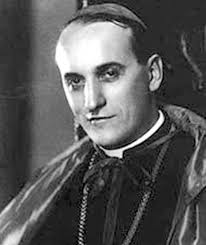On 10 February 1960 Croatia’s Blessed Cardinal Alojzije Stepinac passed away in his house prison or confinement, having suffered several illnesses during his imprisonment. In 1953, Pope Pius XII made him a cardinal, although he was never allowed travel to the Holy See to be officially elevated. He died in 1960 of an alleged blood disorder, which was said to have been caused by the conditions he endured in jail. Recent tests of his remains by Vatican investigators show evidence he was also poisoned.
History and historical research have proven repeatedly that Stepinac was a man whose actions were opposed to the destructive tendencies of both fascist and communist regimes and whose being was burned and defaced by his enemies in order for it not to become a Catholic relic. Croatian Catholics view Pope Francis’s ambivalent relationship towards his predecessor’s spiritual patrimony is less related to issues like universal priestly celibacy or sex abuse in the Church, and much more so with the delayed canonisation of the most significant man of faith in 20th-century Croatia.
On his return from last year’s visit to Bulgaria and Northern Macedonia, the Holy Father was asked about Stepinac’s canonisation, a man whom St. John Paul II declared Blessed in 1998. Francis replied: “The canonisation of Stepinac is a historic case. He is a virtuous man for this Church, which has proclaimed him Blessed, you can pray [through his intercession]. But at a certain moment of the canonisation process there are unclear points, historic points, and I should sign the canonisation, it is my responsibility, I prayed, I reflected, I asked advice, and I saw that I should ask Irinej (Head of Serbian Orthodox Church), a great patriarch, for help. We made a historic commission together and we worked together, and both Irinej and I are interested in the truth. Who is helped by a declaration of sanctity if the truth is not clear? We know that [Stepinac] was a good man, but to make this step I looked for the help of Irinej and they are studying. First of all, the commission was set up and gave its opinion. They are studying other sources, deepening some points so that the truth is clear. I am not afraid of the truth; I am not afraid. I am afraid of the judgment of God.”
Serbian Patriarch Irinej, whom the Pope calls “great”, like many of his predecessors, is a politician as much as he is a priest. Known for his nationalist statements justifying Serbian imperialism—a transgenerational project which underlies every 20th-century War in Former Yugoslavia —Irinej’s observations about Stepinac, who “did not want to hear the children’s cry” in concentration camps, are a first-class manipulation. The inaccuracies of Irinej’s statements about Stepinac and other historical phenomena were reported to Francis by the Episcopal Conference of Croatia before the Pope called him “great,” which makes Francis’s statement quite problematic.
How Pope Francis could say that both he and Irinej are interested in the truth is beyond any decent and objective person’s comprehension. Irinej as head of Serbian Orthodox Church had taken a key and leading role in falsifying Croatian history and WWII. Indeed, all Patriarchs before and after Irinej have been crucial in keeping the lies alive. Pope Francis knows this I am quite sure but what I am not sure is why does Pope Francis insists on talking to pathological liars of the Serbian Orthodox Church without even trying to make them aware that they are liars.
The historical irony is not only that Stepinac was not guilty of the crimes he was accused of – on the contrary, he was not a persecutor (or even a supporter of the persecution) of the Serbian, Jewish and Roma populations, but their saviour. Relevant research in both the Croatian and English languages – including “Stepinac: His Life & Time” by Robin Harris and “When Courage Prevailed: The Rescue and Survival of the Jews in the Independent State of Croatia 1941-1945” and “Alojzije Stepinac: Pillar of Human Rights” by Esther Gitman -show that books on the subject written in communist Yugoslavia do not reflect the truth about the Croatian cardinal and are an ugly fabrication of history; the kind of fabrication that we know communist regimes were capable of and insisted on passing as truthful or factual.
In May 1943, Cardinal Stepinac openly criticised the Nazis and put his own life in danger; he is knowns to have rescued thousands of Jews, Croats, Serbs, and Roma from certain death during that Second World War that was marked by racial laws and extreme intolerance. At the end of World War Two, when communists started ruling over Yugoslavia and immediately set about falsely accusing Stepinac of Nazi collaboration because he would not separate the Croatian Catholic Church from the Vatican as the Yugoslav communist leader Josip Broz Tito sked him to do. Without the right to defence in court Alojzije Stepinac was found guilty of Nazi collaboration at a mock trial, by the communist government and was convicted and sentenced sixteen years` hard labour on October 11, 1946. Archbishop Stepinac was denied effective representation and only met with his attorney for an hour before the trial. The government’s witnesses were told what to say, and the archbishop was not allowed to cross-examine them. After being convicted and sentenced, he spent five years in the notorious and cruel prison for political opponents to communism called Lepoglava, and in 1951, Tito`s government released him and ordered house imprisonment or confinement in the village of Krasic.
Even though the communist Yugoslavia government had forbidden him to resume his duties in the Catholic Church, Archbishop Alojzije Stepinac was elevated to Cardinal by Pope Pius XII on January 12, 1953. In 1985, his trial prosecutor Jakov Blazevic admitted publicly that Cardinal Stepinac`s trial was an entire frame-up, and that Stepinac was tried only because he refused to sever thousand-year-old ties between Croatians and the Roman Catholic Church. On October 3, 1998 in Marija Bistrica, Pope John Paul II beatified Cardinal Alojzije Stepinac, and referred to him as one of the outstanding figures of the Catholic Church.
In his article dated 10 February 2022 published on HKV portal (Croatian Cultural Council) dr Josip Sabol wrote that “today we can convincingly speak of Stepinac as a witness of the time, as a visionary whose visions and ideas became real. Let’s compare the time in which Stepinac lived with ours today. The opposite can hardly be greater: then fascism and communism in Europe – today democracy and the rule of law. Then the Church was persecuted in the socio-cultural catacombs – today the Church in the legally guaranteed freedom of action and presence in public life. Then the Church in the spirit of Pope Pius IX. to Pius XII. – today the Church in the spirit of the Second Vatican Council. Then the nation-state and national consciousness as supreme cultural-political values - today transnational integrations and the globalised world.
We could mention other contradictions between Stepinac’s and today’s time, for example contradictions in ethics, philosophy, morality. One thing is certain: the person of Stepinac and his life’s work are even more relevant today than before. His actuality and universal respect are proved by his beatification. Its universal value and greatness for today’s world and for the further development of the culture of life and salvation in today’s civilisation is proved by the unusual, incomprehensible, and unfounded opposition to the elevation of Blessed Alojzije Stepinac to the altar of holiness by certain circles of society and politics. It is incomprehensible to a Catholic of a critical and open spirit how these unusual pressures on the Catholic Church, specifically on the Pope, could have stopped the already positive process of canonisation of Blessed Alojzije Stepinac.”
I have written before about the utterly unfair and painful moves towards the Catholic faith that Pope Francis has taken in the process of Blessed Alojzije Stepinac’s canonisation by requiring the Serbian Orthodox’s Church’s input (or blessing) when he knows very well that the Serbian Orthodox Church had moulded and controlled Serbian history of aggression towards Croats and falsifying Croatian history particularly that of WWII. If Pope Francis thinks that Stepinac’s WWII role has been one of compromised, then the Pope has a duty towards the Croatian people not to permit Croatia’s enemy and aggressor to help decide upon Stepinac’s canonisation.
Obviously, this is a purely political activity of the Serbian Orthodox Church in Croatia and towards Croatia. The Vatican needs to know that, and it probably does and hence, regretfully, a very visible distancing of many Croatians from the Catholic Church. Catholics in Croatia are asking for an end to the politicking of Croatia’s enemies on the issue of what is sacred and most sacred to the Croatian people and its history. Pope Pius XII proved a completely different attitude towards the Catholic Croatian people by awarding the honour of Cardinal to Archbishop Stepinac in the most difficult circumstances of his life. Pope John Paul II proved the excellence of the attitude of the Holy See towards the Croats by beatifying Cardinal Stepinac. At that time, the world public proved its belief in the truth of everything that was happening in communist Croatia as part of communist Yugoslavia. The American Archbishop Fulton John Sheen is known to have said of Alojzije Stepinac that “He entered the courtroom as the Archbishop of Zagreb and left the courtroom as a universal example of humanity and as the spiritual leader of his Croatian people.”
The inclusion of a non-Catholic religious leader in the process of proclaiming a Catholic saint is to my knowledge unprecedented. Besides writing directly to Pope Francis, receipt of which letter was acknowledged and besides writing several articles on the issue of this ugly, unprecedented canonisation process, which alienates the faithful from their church both spiritually and physically, I am confident many others have pleaded with Pope Frances to stop this ugly madness. Sadly, Francis seems to have initiated an unprecedented number of precedents in the Catholic Church so much so that I have no memory of Catholic people resenting, showing bitter disappointments in the precedents that do not appear to be founded on the faith and Church we have known all our lives.
In a closing statement at the 1946 trial, Blessed Cardinal Alojzije Stepinac said in court: “My conscience is clear, and the future will show that I was right.” And he was right. Historical research and fact findings have unequivocally yielded proclamations of his innocence and for years now Pope Francis has evidently not been able to bring himself to seeing truth! Let’s pray he does! Soon!




